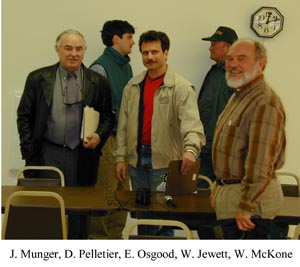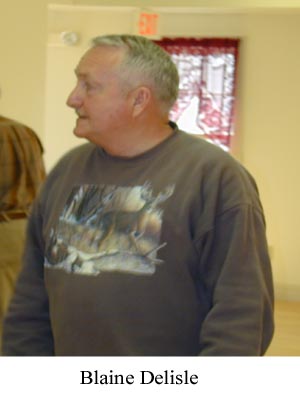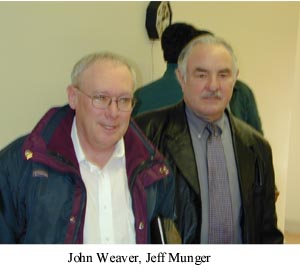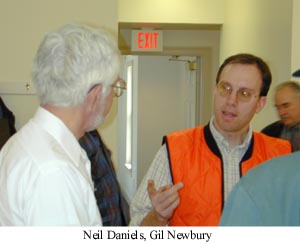
Johnson, VT, April 18, 2001 - The Select Board, Town officials, engineers from the
Vermont Agency of Transportation, a member of Senator Jeffords' staff, and the Vermont
Covered Bridge Society met at the Johnson Municipal Office to discussion the future of the
Power House Covered Bridge.
The attendees were: Blaine Delisle,
Selectboard and Road Commissioner; Neil Daniels, Daniels Construction, Ascutney; Willie
Jewett, Road Foreman; J.B. McCarthy, VTrans Structures, Bill McKone, Vice President,
Vermont Covered Bridge Society (VCBS); J. Jeffrey Munger, of Senator Jeffords' office; Joe
Nelson, President, VCBS; Gil Newbury, VTrans District 8 Administrator; Eric T. Osgood,
Selectboard Chair; Dave Pelletier, LCPC ; Brad Reed, Selectboard; John Weaver, VTrans
Materials.
Jeff Munger told the meeting that
Senator Jeffords is working to get more money into his historic covered bridge program, asking
Secretary of Transportation Mineta to expedite it and work with VTrans to find some funds to
help with the Power House Bridge.
 Last year, the first year of the program,
two covered bridges were earmarked in Vermont; the Cambridge Junction Bridge and the Union
Bridge in Thetford. Two bridges had been selected by Munger and J. B. McCarthy for
the program this year, before the Power House Bridge was lost. These are the Greenbanks
Hollow Bridge in Danville, and the Sanderson Bridge in Brandon. "We'll still go for funds
specifically for your bridge," Munger said.
Last year, the first year of the program,
two covered bridges were earmarked in Vermont; the Cambridge Junction Bridge and the Union
Bridge in Thetford. Two bridges had been selected by Munger and J. B. McCarthy for
the program this year, before the Power House Bridge was lost. These are the Greenbanks
Hollow Bridge in Danville, and the Sanderson Bridge in Brandon. "We'll still go for funds
specifically for your bridge," Munger said.Several options for the Power House Bridge were discussed.. Eric Osgood summed them up in a written statement following the meeting:
Do nothing.
Install side rails on the remaining bridge deck and open it to traffic and leave it as is.
Build a shell consisting of the walls and roof.
Replace the remaining deck with an authentic replica without steel beams.
Replace the shell consisting of the walls and roof with a structure designed that would allow the steel beams to be removed.
The first option apparently, is not an option."We had a petition handed in Monday night with 800 signatures on it to replace the bridge, said Osgood. "So it's pretty obvious where the town is."
The Selectboard favored the fifth option, that of building the sides and roof like the old structure, but designed so the steel beams could be removed at a later date and the structure completed as a true covered Bridge. This option has been an acceptable alternative for the VTrans Historic Preservation Division, said J. B. McCarthy.
The town feels the need to open the bridge quickly. This means opening the steel-beam supported wooden deck for traffic while the new bridge is being planned. "Without that bridge you are creating a heavier load of waiting time for coming on route 15," said Jewett. "At 5 o'clock a lot of people are [risking their lives] as far as trying to get out of there. And the college [traffic] at that time, you've got to have the two bridges, it really relieves traffic."
 The town also wants the bridge back the
way it was, with the self supporting steel-beam supported deck."We'd like to rebuild to
look as like the old one as we possibly could, Delisle said. "And I'm quite sure Willie {Jewett] will
agree with me, our interest in this is maintaining it and the highways, we'd like to see the steel
back."
The town also wants the bridge back the
way it was, with the self supporting steel-beam supported deck."We'd like to rebuild to
look as like the old one as we possibly could, Delisle said. "And I'm quite sure Willie {Jewett] will
agree with me, our interest in this is maintaining it and the highways, we'd like to see the steel
back.""The steel didn't show,"said Jewett. "Even after the steel was put in, it was covered by the siding, so if you ever took a picture of it you couldn't see the steel. The only thing you could see was the pipe underneath, you couldn't see the steel beams. I mean it looks authentic. Even after the steel was put in and the deck was put onto it. The emergency vehicles could use that if something happened. The height was so the fire truck couldn't get through there but the ambulances could. It was 10 foot."
"I've been on the select board that fought a lot of years to get the steel put in there," Reed said. "Because every time we did work on this bridge, within ten years we've got to put $50,000 more in to redo the stringers and stuff in it and that was getting to be an old story. I would hate to see the steel in the deck part taken out and replaced with wood because that bridge gets a lot of traffic. From the college being in session and from people coming into Johnson would rather go that way than go down through 100C again There's a pile of traffic goes through there."
Osgood summarized the possible funding sources in his meeting report: "State grant, Senator Bartlett and Representative Woodward are currently working to secure; The present Covered Bridge Rehabilitate Program, will require application and a 5% Town match; Senator Jeffords' securing an earmarked Federal grant, this would be 100% funding but possibly as late as 2003 construction date.
"At this time we are going forward with all three prospects with the guarantee of none, however very positive possibilities for all," Osgood wrote. "A State grant would probably be the most quickest as far as getting construction started and will be the first option we will know the prospects of acquiring. An earmarked grant from the Federal government we would know in the September time frame, with a pay out in 2002, as well as the Covered Bridge Rehabilitate Program.

During the technical discussion, Blaine Delisle added an interesting highlight on the collapse of the bridge: "That day I was working and drove through it and it was kind of twisting like. We had talked the night before, had looked it over, we were going to try to get the roof shoveled off. Generally when it gets built up very much we give a donation to the firemen, and they go up and shovel the roof off. We were in the process of working on it, getting them to do that. Thank god we didn't, because I think if they'd gotten up there it would have collapsed . . . ."
Return to top Joe Nelson, P.O Box 267, Jericho, VT 05465-0267, jcnelson@together.net
Joe Nelson, P.O Box 267, Jericho, VT 05465-0267, jcnelson@together.netNo part of this web site may be reproduced without the written permission of Joseph C.
Nelson
This file posted August 5, 2001, revised May 24, 2002